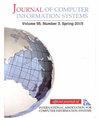跨学科生成人工智能的潜力:观点和未来方向
IF 2.5
4区 管理学
Q2 COMPUTER SCIENCE, INFORMATION SYSTEMS
引用次数: 5
摘要
摘要:生成式人工智能(AI)自推出以来,在很短的时间内引起了个人和组织层面的极大兴趣。这是因为它有可能在生活的许多方面引起剧烈而广泛的变化,堪比互联网和智能手机。更具体地说,生成式人工智能利用机器学习、神经网络和其他技术,通过分析来自训练数据的模式和信息来生成新的内容(例如文本、图像、音乐)。这使得生成式人工智能具有广泛的应用,从创建个性化内容到改善业务运营。尽管生成式人工智能有很多好处,但也有很多人担心它的负面影响。鉴于此,本文汇集了各个领域的专家,就特定行业(即营销、医疗保健、人力资源、教育、银行、零售、工作场所、制造业和可持续IT管理)的生成式人工智能的机遇、挑战和研究议程进行阐述和提供多学科见解。关键词:生成式人工智能机器学习大型语言模型chatgptbard披露声明作者未报告潜在的利益冲突。本文章由计算机程序翻译,如有差异,请以英文原文为准。
The Potential of Generative Artificial Intelligence Across Disciplines: Perspectives and Future Directions
ABSTRACTIn a short span of time since its introduction, generative artificial intelligence (AI) has garnered much interest at both personal and organizational levels. This is because of its potential to cause drastic and widespread shifts in many aspects of life that are comparable to those of the Internet and smartphones. More specifically, generative AI utilizes machine learning, neural networks, and other techniques to generate new content (e.g. text, images, music) by analyzing patterns and information from the training data. This has enabled generative AI to have a wide range of applications, from creating personalized content to improving business operations. Despite its many benefits, there are also significant concerns about the negative implications of generative AI. In view of this, the current article brings together experts in a variety of fields to expound and provide multi-disciplinary insights on the opportunities, challenges, and research agendas of generative AI in specific industries (i.e. marketing, healthcare, human resource, education, banking, retailing, the workplace, manufacturing, and sustainable IT management).KEYWORDS: Generative artificial intelligencemachine learninglarge language modelChatGPTBard Disclosure statementNo potential conflict of interest was reported by the author(s).
求助全文
通过发布文献求助,成功后即可免费获取论文全文。
去求助
来源期刊

Journal of Computer Information Systems
COMPUTER SCIENCE, INFORMATION SYSTEMS-
CiteScore
6.80
自引率
7.10%
发文量
82
审稿时长
>12 weeks
期刊介绍:
The Journal of Computer Information Systems (JCIS) aims to publish manuscripts that explore information systems and technology research and thus develop computer information systems globally.
We encourage manuscripts that cover the following topic areas:
-Analytics, Business Intelligence, Decision Support Systems in Computer Information Systems
- Mobile Technology, Mobile Applications
- Human-Computer Interaction
- Information and/or Technology Management, Organizational Behavior & Culture
- Data Management, Data Mining, Database Design and Development
- E-Commerce Technology and Issues in computer information systems
- Computer systems enterprise architecture, enterprise resource planning
- Ethical and Legal Issues of IT
- Health Informatics
- Information Assurance and Security--Cyber Security, Cyber Forensics
- IT Project Management
- Knowledge Management in computer information systems
- Networks and/or Telecommunications
- Systems Analysis, Design, and/or Implementation
- Web Programming and Development
- Curriculum Issues, Instructional Issues, Capstone Courses, Specialized Curriculum Accreditation
- E-Learning Technologies, Analytics, Future
 求助内容:
求助内容: 应助结果提醒方式:
应助结果提醒方式:


